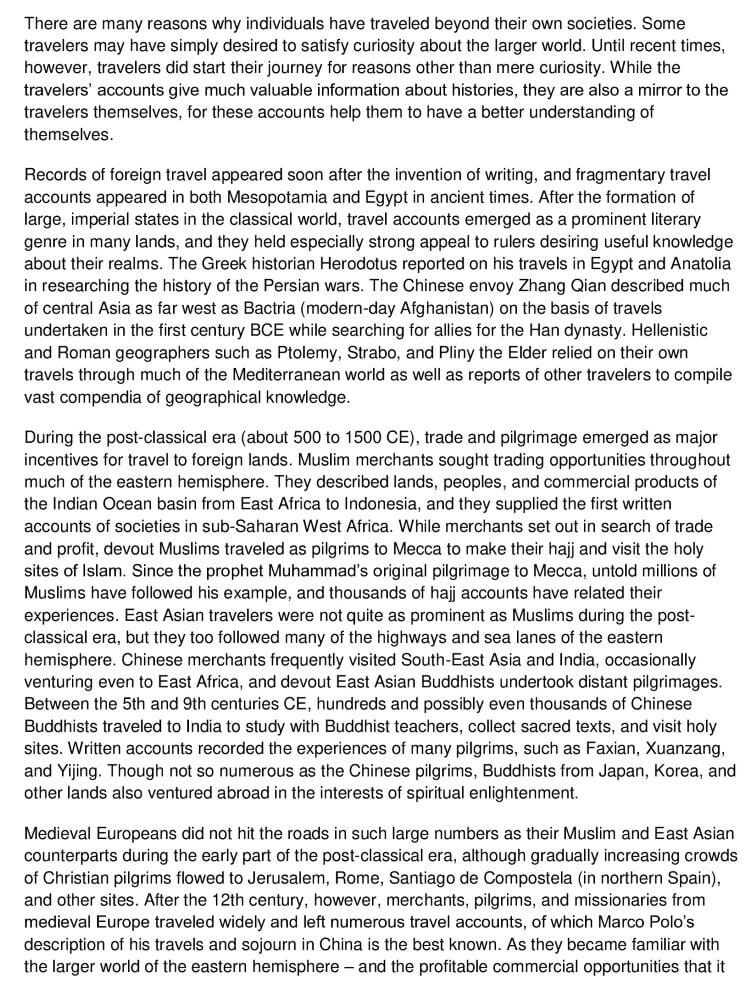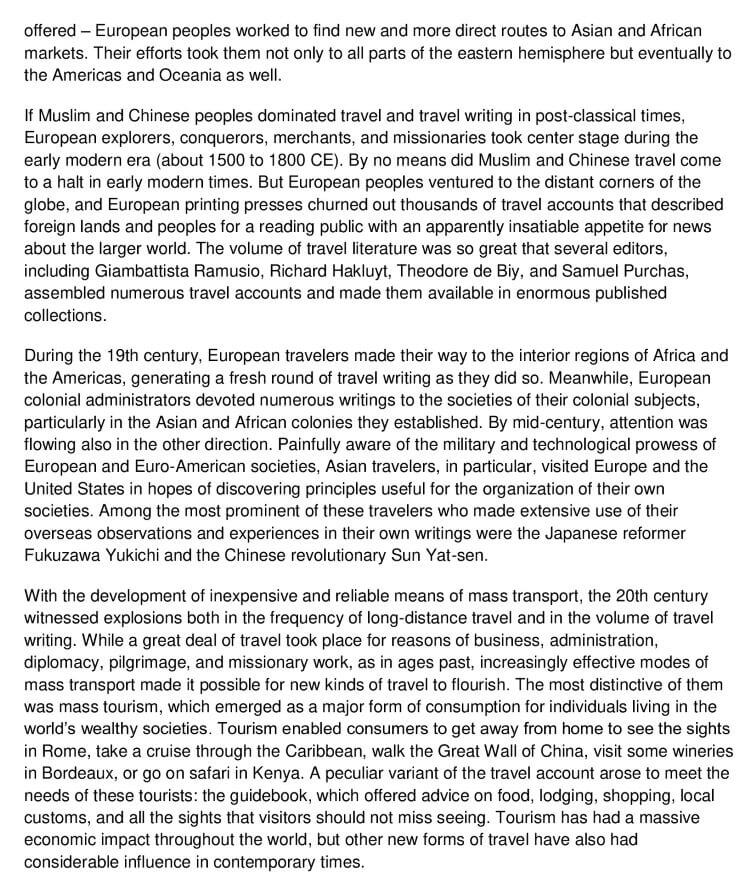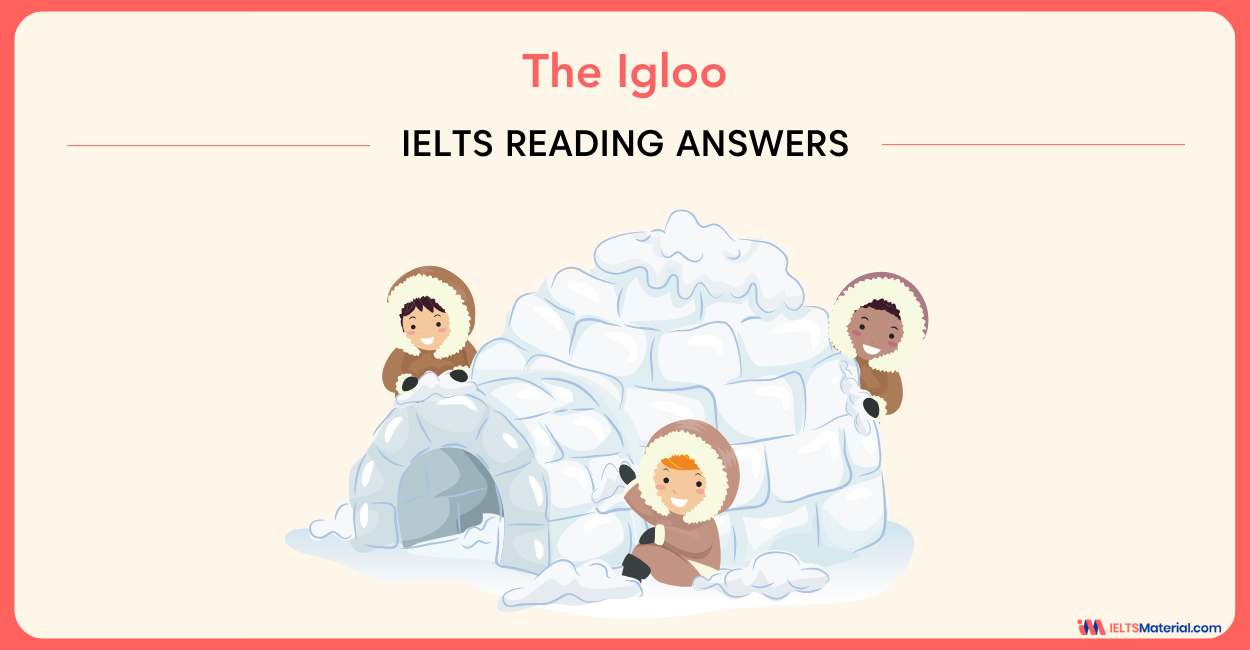Travel Books IELTS Reading Answer
11 min read
Updated On
-
Copy link
Ready to practice the “Travel Books - IELTS Reading” topic to level up your reading skills? And, once you’re done you will also get to check the answers, explanations, along with our expert tips to crack the question types present in it as well
Table of Contents

Limited-Time Offer : Access a FREE 10-Day IELTS Study Plan!
‘Travel Books’ is an IELTS Academic Reading passage is a good resource for anyone who is preparing for the IELTS Reading test. This passage will help you understand what kind of reading passages you will encounter and the questions that you will be asked to solve.
The question types in this IELTS Reading Passage include,
Not sure how to answer IELTS Reading Summary Completion questions? Check out the guide below to learn now!
For more Yes/No/Not/Given Questions practice, take a look at IELTS Reading Yes, No, Not Given Example 1!
Reading Passage
Travel Books


Questions 27-28
Choose the correct letter A, B, C or D.
Write your answers in boxes 27-28 on your answer sheet.
27 What were most people traveling for in the early days?
A Studying their own cultures
B Business
C knowing other people and places better
D Writing travel books
28 Why did the author say writing travel books is also “a mirror” for travelers themselves?
A Because travelers record their own experiences.
B Because travelers reflect upon their own society and life.
C Because it increases knowledge of foreign cultures.
D Because it is related to the development of human society.
Questions 29-36
Complete the table on the next page.
Choose NO MORE THAN TWO WORDS from Reading Passage 3 for each answer.
Write your answer in boxes 29-36 on your answer sheet.
| TIME | TRAVELER | DESTINATION | PURPOSE OF TRAVEL |
|---|---|---|---|
| Classical Greece | Herodotus | Egypt and Anatolia | To gather information for the study of 29…………… |
| Han Dynasty | Zhang Qian | Central Asia | To seek 30…………….. |
| Roman Empire | Ptolemy, Strabo, Pliny the Elder | Mediterranean | To acquire 31…………………. |
| Post-classical Era (about 500 to 1500 CE) | Muslims | From east Africa to Indonesia Mecca | Trading and 32……………… |
| 5th to 9th centuries CE | Chinese Buddhists | 33………………….. | To collect Buddhist texts and for spiritual enlightenment |
| Early modern era (about 1500 to 1800 CE) | European explorers | New World | To satisfy public curiosity for the New World |
| During 19th century | Colonial administrator | Asia, Africa | To provide information for the 34……………….they set up |
| By the mid-century of the 1900s | Sun Yat-sen Fukuzawa Yukichi | Europe and United states | To study the 35…………….for the reorganization of their societies |
| 20th century | People from 36………………. countries | Mass tourism | Entertainment and pleasure |
Questions 37-40
Choose the correct letter A, B, C or D.
Write your answers in boxes 37-40 on your answer sheet.
37 Why were the imperial rulers especially interested in these travel stories?
A Reading travel stories was a popular pastime.
B The accounts are often truthful rather than fictional.
C Travel books played an important role in literature.
D They desired knowledge of their empire.
38 Who was the largest group to record their spiritual trips during the post-classical era?
A Muslim traders
B Muslim pilgrims
C Chinese Buddhists
D Indian Buddhist teachers
39 During the early modern era, a large number of travel books were published to
A meet the public’s interest.
B explore new business opportunities.
C encourage trips to the new world.
D record the larger world.
40 What’s the main theme of the passage?
A The production of travel books
B The literary status of travel books
C The historical significance of travel books
D The development of travel books
Travel Books IELTS Reading Answer with Explanation
Check out the detailed answers for the questions given above and get an idea of how to improve your reading skills for a top IELTS Reading band score.
27 Answer: C
Question type: Multiple Choice Question
Answer location: Paragraph 1, line 2
Answer explanation: The 2nd line of the first paragraph states that Some travelers may have simply desired to satisfy curiosity about the larger world. Until recent times, however, travelers did start their journey for reasons other than mere curiosity. While the travelers’ accounts give much valuable information on these foreign lands and provide a window for the understanding of the local cultures and histories, they are also a mirror to the travelers themselves, for these accounts help them to have a better understanding of themselves. We can deduce from these lines that travelers simply desire to satisfy the curiosity of the outside world. Most people travel as they want to understand and get acquainted with new people and places. Thus, the answer is C.
28 Answer: B
Question type: Multiple Choice Question
Answer location: Paragraph 1, line 3
Answer explanation: The 3rd line of the first paragraph states, “While the travelers’ accounts give much valuable information on these foreign lands and provide a window for the understanding of the local cultures and histories, they are also a mirror to the travelers themselves, for these accounts help them to have a better understanding of themselves.” These lines suggest that traveling provides information on cities abroad and a window to better understand the local cultures and histories. They’re also a mirror to the travelers themselves for these accounts help them to gain a better understanding of themselves. Thus, the author says writing travel books are a mirror for travelers themselves because travelers reflect upon their society and life. Thus, the answer is B.
29 Answer: Persian wars
Question type: Table Completion
Answer location: Paragraph 2, line 5
Answer explanation: The 5th line of the 2nd paragraph states that the Greek historian Herodotus reported on his travels in Egypt and Anatolia in researching the history of the Persian wars. These lines suggest that during the time of classical Greece, travelers Herodotus reported on his travels in Egypt and Anatolia to gather information for the study of Persian wars. Thus, the answer is the Persian wars.
30 Answer: allies
Question type: Table Completion
Answer location: Paragraph 2, lines 6 – 7
Answer explanation: The 6th line of paragraph 2 illustrates that the Chinese envoy Zhang Qian described much of central Asia as far west as Bacteria (modern-day Afghanistan) based on travels undertaken in the first century BCE while searching for allies for the Han dynasty. We can deduce from these lines that during the Hans dynasty, traveler, Zhang Qian traveled Central Asia in search of allies. Thus, the answer is allied.
31 Answer: geographical knowledge
Question type: Table Completion
Answer location: Paragraph 2, last line
Answer explanation: The last line of the 2nd paragraph is that Hellenistic and Roman geographers such as Ptolemy, Strabo, and Pliny the Elder relied on their travels through much of the Mediterranean world as well as reports of other travelers to compile vast compendia of geographical knowledge. These lines indicate that during the time of the Roman empire, Roman travelers and Geographers like Ptolemy, Strabo, and Pliny the Elder depended on their travels through the Mediterranean to acquire a vast compendium of geographical information/ knowledge. Thus, the answer is geographical knowledge.
32 Answer: pilgrimage
Question type: Table Completion
Answer location: Paragraph 3
Answer explanation: The initial lines of the 3rd paragraph reveals that during the post-classical era (about 500 to 1500 CE), trade and pilgrimage emerged as major incentives for travel to foreign lands. These lines indicate that after the post-classical period, Muslim travelers traveled from East Africa to Indonesia Mecca for trading and pilgrimage. Thus, the answer is a pilgrimage.
33 Answer: India
Question type: Table Completion
Answer location: Paragraph 3, line 13
Answer explanation: The 13th line of the 3rd paragraph illustrates that between the 5th and 9th centuries CE, hundreds and possibly even thousands of Chinese Buddhists traveled to India to study with Buddhist teachers, collect sacred texts, and visit holy sites. Written accounts recorded the experiences of many pilgrims. We can deduce from these lines that during the 5th and 9th centuries, the Chinese Buddhists traveled to India to collect Buddhist texts and for spiritual enlightenment. Thus, the answer is India.
34 Answer: colonies
Question type: Table Completion
Answer location: Paragraph 6, line 2
Answer explanation: The 2nd line of the 6th paragraph states that European colonial administrators devoted numerous writings to the societies of their colonial subjects, particularly in the Asian and African colonies they established. These lines indicate that during the 19th century, the colonial administrator traveled to Asia and Africa to provide information for the colonies they set up. Thus, the answer is colonies.
35 Answer: principles
Question type: Table Completion
Answer location: Paragraph 6, line 5
Answer explanation: The 5th line of the 6th paragraph illustrates, “Painfully aware of the military and technological prowess of European and Euro-American societies, Asian travelers, in particular, visited Europe and the United States in hopes of discovering principles useful for the organization of their societies.” We can deduce from these lines that by the mid-century of the 1900s, Sun Yat-sen Fukuzawa Yukichi traveled to Europe and US, to study the principles for the reorganization of their societies. Hence, the answer is principles.
36 Answer: wealthy
Question type: Table Completion
Answer location: Paragraph 8, line 5
Answer explanation: The 5th line of the 8th paragraph states that the most distinctive of them was mass tourism, which emerged as a major form of consumption for individuals living in the world’s wealthy societies. These lines indicate that by the 20th century, people from wealthy countries traveled mass tourism for entertainment and pleasure. Thus, the answer is wealth.
37 Answer: D
Question type: Multiple Choice Question
Answer location: Paragraph 2, line 2
Answer explanation: The 2nd line of 2nd paragraph states that after the formation of large, imperial states in the classical world, travel accounts emerged as a prominent literary genre in many lands, and they held especially strong appeal for rulers desiring useful knowledge about their realms. We can understand from these lines that post the formation of huge imperial states in the classical period, the imperial rulers were especially interested in the travel stories as they desired knowledge of their kingdoms (realm). Hence, the answer is D.
38 Answer: B
Question type: Multiple Choice Question
Answer location: Paragraph 3, lines 5 & 15
Answer explanation: In the 5th line of the 3rd paragraph, it is mentioned that while merchants set out in search of trade and profit, devout Muslims traveled as pilgrims to Mecca to make their hajj and visit the holy sites of Islam. The 15th line states that written accounts recorded the experiences of many pilgrims. It is a well-known fact that during the post-classical era (about 500 to 1500 CE), Muslims traveled from East Africa to Indonesia and Mecca for trading and pilgrimage. Therefore, it is evident that Muslim pilgrims were the largest group to record their spiritual trips during the post-classical era. Thus, the answer is B.
39 Answer: A
Question type: Multiple Choice Question
Answer location: Paragraph 5, line 3
Answer explanation: Paragraph 5 states the fact that the Muslim and Chinese dominated travel and travel writing in post-classical times. The 3rd line states that by no means did Muslim and Chinese travel come to a halt in early modern times. But European peoples ventured to the distant corners of the globe, and European printing presses churned out thousands of travel accounts that described foreign lands and peoples for a reading public with an insatiable appetite for news about the larger world. The volume of travel literature was so great that several editors, including Giambattista Ramusio, Richard Hakluyt, Theodore de Biy, and Samuel Purchas, assembled numerous travel accounts and made them available in enormous published collections. These lines demonstrate that Europeans ventured to distant places churning out thousands of travel accounts that describe foreign and public interest in reading those books. Therefore, it is clear that during the early modern era, a large number of travel books were published to meet the public’s interests. Thus, the answer is A.
40 Answer: D
Question type: Multiple Choice Question
Answer location: Paragraph 1 – 8
Answer explanation: The 8th line of the first paragraph states that there are many reasons why individuals have traveled beyond their societies. Some travelers may have simply desired to satisfy curiosity about the larger world. We can understand from these lines that the main theme of the passage is the development of travel books. Thus, the answer is D.
[/showhideContent]
Get high scores on passages like ‘T-Rex Reading Answers’ by using our exclusive IELTS Reading guide!
Tips for Answering the Question Types in Travel Books IELTS Reading Answers
Despite knowing the answers to the questions in Travel Books IELTS Reading Answers, it might not be enough when you want to give your best on the IELTS test. So let’s quickly go over some tips for solving Travel Books IELTS Reading Answers.
Multiple-Choice Questions
These questions ask you to choose the correct answer from a list of options based on the passage’s information.
- Read the Question Carefully: Understand exactly what the question is asking before looking at the options.
- Scan for Keywords: Identify keywords in the question and options, then find their locations in the passage.
- Eliminate Clearly Wrong Options: Cross out options that are clearly incorrect based on the passage to narrow down your choices.
- Look for Synonyms: The passage may use different words than those in the options, so look for synonyms or paraphrasing.
- Cross-Check Answers: Ensure that your chosen answer directly answers the question and matches the information in the passage.
Table Completion in IELTS Reading
Table Completion questions require you to fill in the gaps in a table using information from the passage. Each gap corresponds to a piece of information from the text. Following are some tips:
- Understand the Table Structure: Before reading the passage, examine the table to understand what information is required and how it’s organized (e.g., dates, names, locations).
- Locate the Relevant Section: Scan the passage for keywords or phrases related to the table’s headings and gaps to find where the required information is discussed.
- Use the Exact Words: When filling in the table, use the exact words from the passage if possible. Be careful not to change the wording or add extra information.
- Check for Consistency: Ensure that the information you write in the table makes sense and fits with the surrounding context. Double-check that it aligns with the passage content.
- Be Mindful of Word Limits: Pay attention to any word limits for your answers (e.g., “no more than three words”). Adhere to these limits when filling in the gaps.
Check More IELTS Reading Answers
Practice IELTS Reading based on question types

Start Preparing for IELTS: Get Your 10-Day Study Plan Today!
Explore other Reading Topics

Kasturika Samanta

Kasturika Samanta

Kasturika Samanta

Kasturika Samanta
Recent Articles

Nehasri Ravishenbagam

Haniya Yashfeen

Haniya Yashfeen

Haniya Yashfeen




Post your Comments